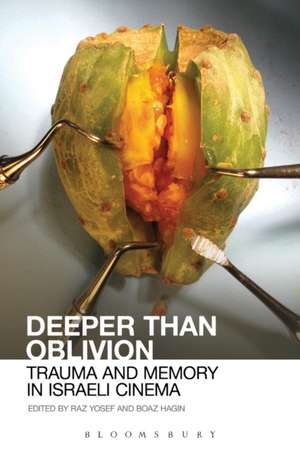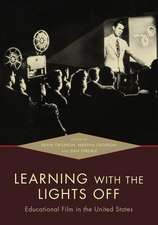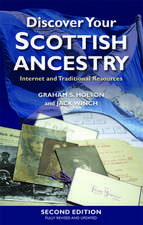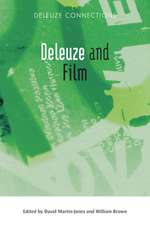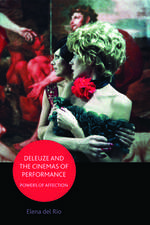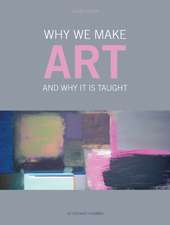Deeper than Oblivion: Trauma and Memory in Israeli Cinema
Editat de Raz Yosef, Boaz Haginen Limba Engleză Paperback – 18 mai 2016
| Toate formatele și edițiile | Preț | Express |
|---|---|---|
| Paperback (1) | 260.43 lei 43-57 zile | |
| Bloomsbury Publishing – 18 mai 2016 | 260.43 lei 43-57 zile | |
| Hardback (1) | 835.11 lei 43-57 zile | |
| Bloomsbury Publishing – 31 iul 2013 | 835.11 lei 43-57 zile |
Preț: 260.43 lei
Preț vechi: 332.71 lei
-22% Nou
Puncte Express: 391
Preț estimativ în valută:
49.84€ • 51.74$ • 41.56£
49.84€ • 51.74$ • 41.56£
Carte tipărită la comandă
Livrare economică 24 martie-07 aprilie
Preluare comenzi: 021 569.72.76
Specificații
ISBN-13: 9781501319617
ISBN-10: 1501319612
Pagini: 384
Ilustrații: 20 bw illus
Dimensiuni: 152 x 229 x 31 mm
Greutate: 0.51 kg
Ediția:NIPPOD
Editura: Bloomsbury Publishing
Colecția Bloomsbury Academic
Locul publicării:New York, United States
ISBN-10: 1501319612
Pagini: 384
Ilustrații: 20 bw illus
Dimensiuni: 152 x 229 x 31 mm
Greutate: 0.51 kg
Ediția:NIPPOD
Editura: Bloomsbury Publishing
Colecția Bloomsbury Academic
Locul publicării:New York, United States
Caracteristici
Growing interest in Israeli cinema brings new courses, publications, and conferences in trauma/memory studies
Notă biografică
Raz Yosef is Senior Lecturer and the chair of the cinema studies B.A. Program at the Department of Film and Television, Tel Aviv University. He is the author of Beyond Flesh: Queer Masculinities and Nationalism in Israeli Cinema (2004), To Know a Man: Masculinity, Sexuality and Ethnicity in Israeli Cinema (2010, in Hebrew), The Politics of Loss and Trauma in Contemporary Israeli Cinema (2011), and co-editor of Just Images: Ethics and the Cinematic (2011). Boaz Hagin is Lecturer at the Department of Film and Television, Tel Aviv University. He is author of Death in Classical Hollywood Cinema (2010), co-editor of Just Images: Ethics and the Cinematic (2011), and co-author with Thomas Elsaesser of Memory, Trauma, and Fantasy in American Cinema (2012, in Hebrew).
Cuprins
Acknowledgments Chapter 1: Sweet on the Inside: Trauma, Memory, and Israeli CinemaBoaz Hagin and Raz YosefChapter 2:Postscript to Israeli Cinema: East/West and the Politics of Representation Ella ShohatChapter 3:Gender, the Military, Memory, and the Photograph: Tamar Yarom's To See If I'm Smiling and American Films about Abu GhraibDiane WaldmanChapter 4:The Event and the Picture: David Perlov's My Stills and Memories of the Eichmann TrialAnat ZangerChapter 5:The Agonies of an Eternal Victim: Zionist Guilt in Avi Mograbi's Happy Birthday, Mr. MograbiShmulik DuvdevaniChapter 6:Traces of War: Memory, Trauma, and the Archive in Joseph Cedar's BeaufortRaz YosefChapter 7:Memory of a Death Foretold: Fathers and Sons in Assi Dayan's "Trilogy" Yael MunkChapter 8:Queering Terror: Trauma, Race, and Nationalism in Palestinian and Israeli Gay Cinema during the Second IntifadaRaya MoragChapter 9:"Our Traumas": Terrorism, Tradition, and Mind Games in Frozen DaysBoaz HaginChapter 10:History of Violence: From the Trauma of Expulsion to the Holocaust in Israeli Cinema Nurith Gertz and Gal Hermoni Chapter 11: Last Train to the HolocaustJudd Ne'eman and Nerit GrossmanChapter 12: Passages, Wars, and Encounters with Death: The Desert as a Site of Memory in Israeli FilmYael Zerubavel Chapter 13: "Walking through walls": Documentary Film and Other Technologies of Navigation, Aspiration, and MemoryJanet Walker Notes on ContributorsIndex
Recenzii
This intriguing collection of essays provides a perceptive and thought provoking look at Israeli cinema and its relations to Israeli society. It contains various approaches to the cinematic contemplations of 'trauma' in Israeli film, which shed new light on the fundamentals of the Israeli experience in the past decades. In going beyond the commonly discussed canon of Israeli films, the articles in Deeper than Oblivion illustrate the contour of a novel framework for the reading of Israeli cinema and its cultural significance. It is an essential addition to the growing scholarship on Israeli culture.
This timely collection offers a spectrum of critical perspectives on Israel's past and present through the lens of its cinema. In addition to examining a wide range of reactions to trauma and memory, the essays explore the tension between fiction and documentary, space and identity, and aesthetics and politics. The engaging book reveals the richness of Israeli cinema and its astonishing resonance for us today.
This collection of sophisticated articles exposes how Israeli cinema navigates the web of traumas that constitute the collective national memory as well as threaten the coherence of the familiar Zionist meta-narrative. Discussing traumas of wars, the Naqba, the Holocaust, the trauma of the perpetrator, of immigration and of dislocating others, of terrorism, of occupation, and of guilt and responsibility these articles offer critical reflection on Israeli histories and cultures.
Deeper Than Oblivion is an ambitious project that explores the representation of personal and collective traumas in Israeli cinema . . . [The book] does not simply constitute an introductory volume to key tropes in Israeli cinema, but presents a refreshingly in-depth study of questions of personal recollection, and collective and cultural memory . . . Yosef and Hagin have perfectly pitched their study
This timely collection offers a spectrum of critical perspectives on Israel's past and present through the lens of its cinema. In addition to examining a wide range of reactions to trauma and memory, the essays explore the tension between fiction and documentary, space and identity, and aesthetics and politics. The engaging book reveals the richness of Israeli cinema and its astonishing resonance for us today.
This collection of sophisticated articles exposes how Israeli cinema navigates the web of traumas that constitute the collective national memory as well as threaten the coherence of the familiar Zionist meta-narrative. Discussing traumas of wars, the Naqba, the Holocaust, the trauma of the perpetrator, of immigration and of dislocating others, of terrorism, of occupation, and of guilt and responsibility these articles offer critical reflection on Israeli histories and cultures.
Deeper Than Oblivion is an ambitious project that explores the representation of personal and collective traumas in Israeli cinema . . . [The book] does not simply constitute an introductory volume to key tropes in Israeli cinema, but presents a refreshingly in-depth study of questions of personal recollection, and collective and cultural memory . . . Yosef and Hagin have perfectly pitched their study
